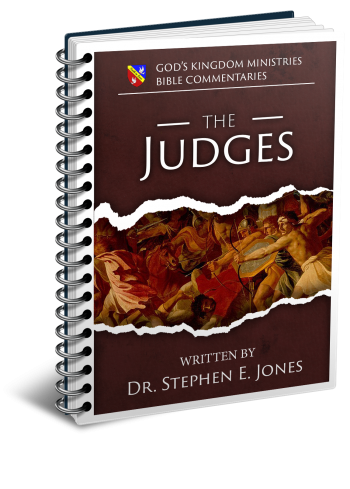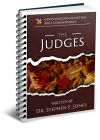Latest Posts
View the latest posts in an easy-to-read list format, with filtering options.

Two books in one. The first book is how the Judges themselves are named prophetically to give a message of Sonship. Book 2 is a commentary on the last 5 chapters of the book of Judges, presenting examples of how Israel was lawless after the death of Joshua.
Category - Bible Commentaries

After Gideon subdued the Midianites, he remained their leader until “a ripe old age” (Judges 8:32). The people offered to make him king of Israel, but he declined. Judges 8:22, 23 tells us,
22 Then the men of Israel said to Gideon, “Rule over us, both you and your son, also your son’s son, for you have delivered us from the hand of Midian.” 23 But Gideon said to them, “I will not rule over you, nor shall my son rule over you; the Lord shall rule over you.”
This is the first evidence we have that the people were starting to be tired of God’s rule. They thought He was being unreasonable and tyrannical for putting Israel into captivity every time the people turned to idols. God’s standards were too high. It seems that the prophet who preached to them before their deliverance (Judges 6:8) had convinced them that God was responsible for bringing them into captivity when the people became lawless. But instead of submitting to God’s law, they wanted to revolt and set up a more tolerant king.
Strangely enough, though Gideon refused to be a king in Israel, he asked for donations of gold, which he then fashioned into an ephod. Judges 8:27 says,
27 And Gideon made it into an ephod and placed it in his city, Ophrah, and all Israel played the harlot with it there, so that it became a snare to Gideon and his household.
The ephod of the high priest in Shiloh contained two stones (urim and Thummim in Lev. 8:7, 8) which acted as “lots” for the high priest to determine either “yes or no” or “guilt or innocence” when they inquired of the Lord. The golden ephod in Ophrah was an alternative to that which was in Shiloh.
So even though Gideon refused to set up a false monarchy, he led the Israelites into idolatry and sin by setting up a false ephod as an object of worship. He set it up in his hometown of Ophrah, which comes from the root word aphar, “to be dust, or powder.” Perhaps this suggests a connection to the golden calf which Aaron made for the Israelites in the wilderness. Moses ground it to powder, cast it into the water, and made the people drink it (Exodus 32:20).
Whatever the case, Gideon lived to regret making the ephod, for “it became a snare” to him. I do not think he himself worshiped this ephod, nor did he use it to divine the word of the Lord. I believe that he later repented of making the ephod and tried to shut down the shrine, but by this time the people viewed it as sacred and would not allow it to be destroyed or set aside. Unfortunately, Gideon’s own household were leaders in this apostasy, causing Gideon himself to move out of the house. Judges 8:29 says,
29 Then Jerubbaal [i.e., Gideon] the son of Joash went and lived in his own house.
Gideon was given the name Jerubbaal at the beginning of his career after he cut down the alter of Baal that his father, Joash, had built (Judges 6:25). When the people discovered what he had done, they wanted to kill Gideon for his sacrilege, but his father defended him, saying, “If he [Baal] is a god, let him contend for himself.” That is how Gideon got a new name, for we read in Judges 6:32,
32 Therefore, on that day he named him Jerubbaal, that is to say, “Let Baal contend against him,” because he had torn down his altar.
Obviously, Gideon came from an idolatrous family, and even after delivering Israel from captivity, he had been unable to change the hearts of his own family, let alone the other Israelites. The biblical record here switches suddenly and calls him Jerubbaal in order to remind us of his earlier action in tearing down the altar of Baal. This suggests that Gideon wanted to destroy the golden ephod as well, but this time he was prevented from doing so.
Gideon’s opposition to ephod worship caused many to resent him. They did not rise up against him during his lifetime, but after he was dead, Gideon’s sons were killed. Judges 8:33-35 says,
33 Then it came about, as soon as Gideon was dead, that the sons of Israel again played the harlot with the Baals and made Baal-berith their god. 34 Thus the sons of Israel did not remember the Lord their God, who had delivered them from the hands of all their enemies on every side; 35 nor did they show kindness to the household of Jerubbaal (that is, Gideon), in accord with all the good that he had done to Israel.
The land of Israel rested forty years from its previous captivity, but “as soon as Gideon was dead,” the people immediately turned to false gods (Judges 8:33, 34). This shows that the people were somewhat restrained by Gideon’s presence, and his death brought idolatry to the forefront.
Likewise, Gideon’s steadfast refusal to be their king did not stop the people from desiring to revolt against God. As soon as Gideon was dead, one of Gideon’s sons, Abimelech, saw his opportunity to become king. This brought about a civil war in Israel.
Gideon’s name means “feller,” that is, a wood cutter, or lumberman. Trees were a metaphor for men (Deut. 20:19, KJV and Mark 8:24). Hence, it is said that Gideon means “warrior,” one who cuts down men as if they were trees.
In the sequence of the Judges’ names, Gideon’s name contributes to the overall revelation:
“The voice of God united in His sons (in an orderly manner that is subject to God’s Word) will fell the enemy and open the Ark to show forth the light of the Sun.”
The word of God, which is the light in these earthen vessels, is that which will “fell the enemy,” as in the days of Gideon.